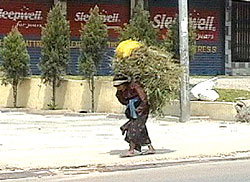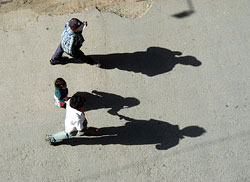|
|
She is a tiny thing, not even five feet tall standing up and only about half that distance from the ground with the heavy burden of grass on her back. Her steps are small but sure in the hot midday sun.
Around her, young men roam in packs on Day 2 of the General Strike. Some have smiles on their faces, detracting from the venom of the anti-monarchy slogans. She is in their blind spot. They spot a motorcyclist and his passenger. "Hande, hande," cries a voice from the crowd and things look sticky for the helpless rider when suddenly an overstuffed trolley bus grinds past. Stones are hurled and glass shatters on the road. There are a few cheers from the protesters. This is looked upon as a victory of sorts, their bit for democracy and the ordinary Nepali everyman. Or everywoman.
Everywoman in this case is bent double under the grass (pic above), with little opportunity to look or much less participate in the revolution being waged in her name. She can't see the people watching the street protesters from the tops of tall buildings or at a safe distance from the action. She shuffles past casino employees who have popped out during a break to watch the action. One side lobs bricks, the other tear gas and the spectators just look on.
Like a game of advance and retreat, the mob scatters into the narrow alleys below the main road when riot police arrive. They regroup as soon as the police van moves on. Many are children. The adults have raised fists and voices. Someone issued them a license to vandalise and they seem to be taking their job seriously. The arrival of a tv crew adds an incentive- now they can watch themselves in the evening news.
|
|
I insist. She declines again. Smiling. She adjusts the band that supports the weight of the grass on her head and neck before setting off again.
Below us a putrid stream choked with empty plastic water bottles. On the bridge are bricks, burning tyres and broken glass. Acrid smoke curls into the blue sky. I ask her name and where she comes from. "Mausuli from Ramechhap," she says briefly. I hear Mausami but she corrects me. I keep pace with her for a while, both of us walking in silence.
It's brisk business for the fruit sellers who have set up shop close to Maitighar. Revolution whips up the appetite of protesters, passersby and people who need snacks to watch the street theatre. We walk past a group of riot police on a khaja break. It's a standard issue snack: Fruti and instant noodles. A father teaches his son to ride a bicycle at Thapathali. A few motorbikes whiz past as do large SUVs with
blue plates.
Finally at the lights before the Bagmati bridge, Mausuli and I part ways. As she recedes into the distance all I see on the other side of another smelly river are empty promises of plenty on billboards shimmering in the heat.





